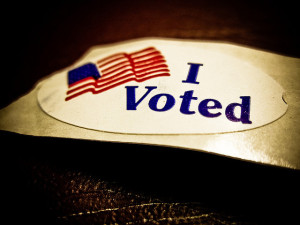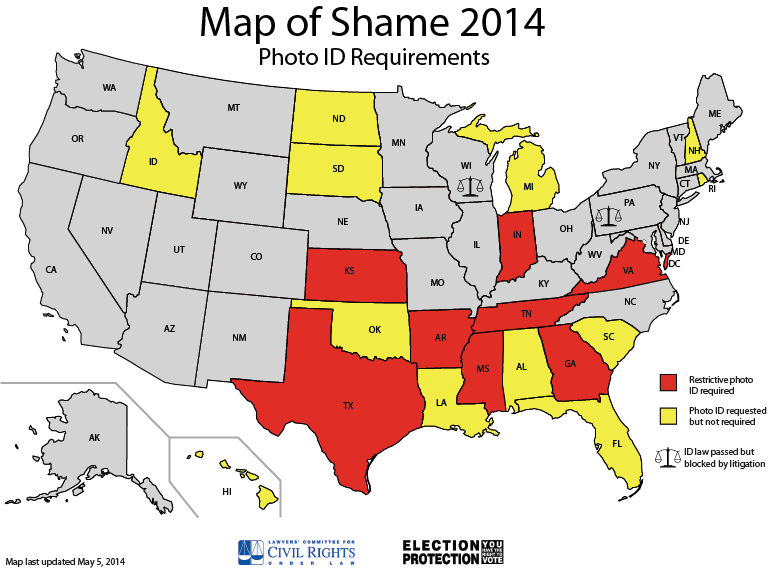
Head Smacker: Voter ID Laws Further Silence Those Whose Voices Need To Be Heard The Most
Check out this post from the Coalition on Human Needs' Senior Policy Writer Lecia Imbery:
“There is only one motivation for imposing burdens on voting that are ostensibly designed to discourage voter-impersonation fraud, if there is not actual danger of such fraud, and that is to discourage voting by persons likely to vote against the party responsible for imposing the burden.” – 7th Circuit Court of Appeals Judge Richard A. Posner, in his dissenting opinion about the voter ID law in Wisconsin.
With the midterm elections less than 3 weeks away, voter ID laws have been the subject of debate and discussions across the country and in the news lately. The debate was fueled, of course, by recent action by the U.S. Supreme Court, which last week blocked (at least for this upcoming election) a voter ID law in Wisconsin requiring voters to show a photo ID before casting their ballots. That same week, Judge Posner, a highly respected, influential, and conservative judge – and a judge who had previously supported a voter ID law in Indiana – released a scathing opinion of the proposed Wisconsin law, saying that such strict laws are “efforts to disenfranchise voters likely to vote for the political party that does not control the state government.”
Also last week, a federal judge in Texas struck down a similar photo voter ID law there on the grounds that it would have an “impermissible discriminatory effect against Hispanics and African-Americans and was imposed with an unconstitutional discriminatory purpose.” The Texas law was reinstated by an appeals court yesterday.
Those who support voter ID laws like those in Wisconsin and Texas say that they will prevent voter fraud. An editorial in the New York Times and a piece in the Washington Post, both published on Monday, both pointed to research showing that that widespread voter fraud doesn’t exist, and even if it did, most voter ID laws wouldn’t stop it. Or, as Judge Posner puts it,
“As there is no evidence that voter-impersonation fraud is a problem, how can the fact that a legislature says it’s a problem turn it into one? If the Wisconsin legislature says witches are a problem, shall Wisconsin courts be permitted to conduct witch trials?”
Rather than preventing fraud, what most voter ID laws will do is prevent the already disenfranchised from voting at all, which some believe is the intent of the laws’ supporters all along. Both the Times and the Post pieces cited a recent report from the U.S. Government Accountability Office (GAO) that shows that voter ID laws decreased turnout in the 2012 elections in Kansas and Tennessee, mainly among young, newly registered, and African American voters (both Tennessee’s secretary of state and Kansas’ secretary of state reject the findings in letters to GAO included in the report).
The GAO report also looked at the direct costs of obtaining an ID in the 17 states that require voters to present one in order to vote. They found that the direct cost of obtaining a driver’s license varied from $14.50 to $58.50. To be sure, some states offer free IDs that would work for voting purposes, but even if the ID is free, is doesn’t factor in all of the indirect costs of obtaining one – like lost pay when taking time off from work, transportation to get to the government building issuing the ID, etc.
For those who aren’t sure where their next meal is coming from, these costs could very well be prohibitive. And the Head Smacker is this – those who need government services and protections the most are the ones whose votes are being suppressed by voter ID laws. Those whose voices most need to be heard are silenced again.
Until we can get rid of all of the voter ID laws that further disenfranchise the already disenfranchised, there’s something you can do today that isn’t a Head Smacker at all; in fact, it’s completely logical AND the right thing to do: pledge to vote.
The candidates elected this November may decide on (or stand in the way of) some pretty critical issues: minimum wage, immigration reform, labor and voting rights, and whether to invest in or cut services like education, child care, nutrition or housing. They’ll be deciding whether to get fair revenues from corporations and wealthy individuals or to hand them hundreds of billions in tax breaks. They will try to gut the Affordable Care Act, or protect against that. In states, there will be opportunities to expand Medicaid, or provide paid leave – or not.
pretty critical issues: minimum wage, immigration reform, labor and voting rights, and whether to invest in or cut services like education, child care, nutrition or housing. They’ll be deciding whether to get fair revenues from corporations and wealthy individuals or to hand them hundreds of billions in tax breaks. They will try to gut the Affordable Care Act, or protect against that. In states, there will be opportunities to expand Medicaid, or provide paid leave – or not.
All these big decisions will hinge on turnout. So making sure you and your colleagues, friends, neighbors, clients, and everyone you know are registered and encouraging them to vote can change outcomes.
Check out some useful links we’ve compiled to see your state’s voter registration deadline, information on online registration, and information on early voting and registering voters fromNonprofit Vote. The League of Women Voters’ Vote411.org also has information on polling places, candidates’ information, and even a section that will tell you what type of voter ID is required in your state.
Please take our pledge to vote and share with your network, and leave your comments on voting and voter ID laws below.



The views and opinions expressed in this post are those of the author(s) and do not necessarily reflect those of MomsRising.org.
MomsRising.org strongly encourages our readers to post comments in response to blog posts. We value diversity of opinions and perspectives. Our goals for this space are to be educational, thought-provoking, and respectful. So we actively moderate comments and we reserve the right to edit or remove comments that undermine these goals. Thanks!